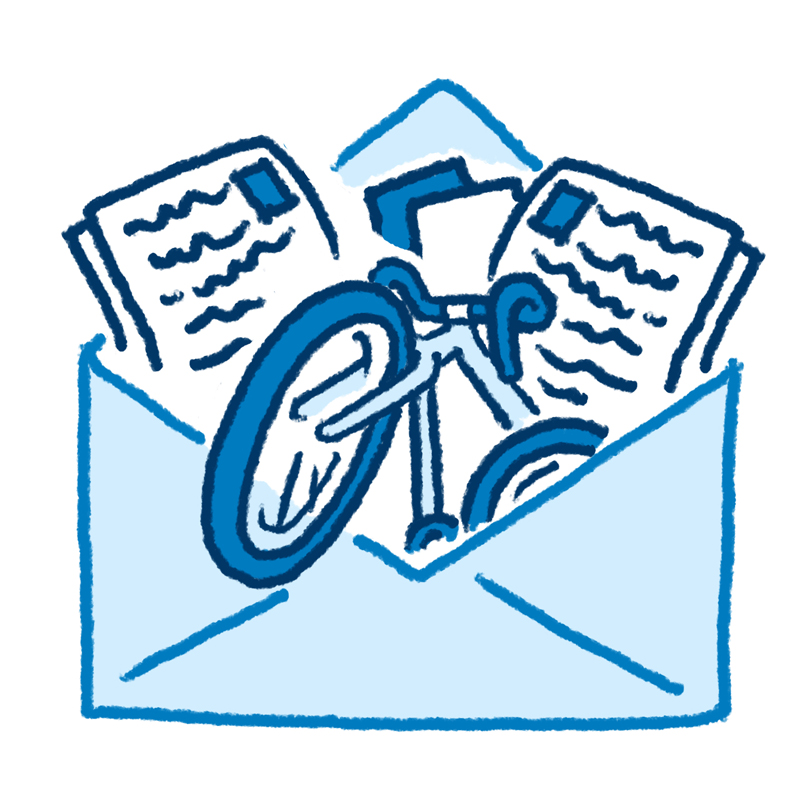When Tomorrow Might Not Come
If you had asked me two years ago whether I could complete a cross-country bike ride, I would have laughed hysterically, having only ridden a maximum of five miles in my entire life. I genuinely questioned whether I was capable of cycling over 4,000 miles. And yet the entire ride was a surprise to me.
For as long as I can remember, my family has always been quite adventurous and active. I was always into sports — basketball, tennis, badminton. And almost every year, my family and I would take a road trip to national parks across America, shaping an adventurous spirit in me.
Because I wasn’t an experienced cyclist prior to this summer, the idea of going on a cross-country bike ride was quite scary. But last year, after losing my grandmother to kidney cancer, I caught wind of the Illini 4000.

Illini 4000 is “a nonprofit organization dedicated to documenting the American cancer experience through the Portraits Project, raising funds for cancer research and patient support services, as well as spreading awareness for the fight against cancer through annual cross-country bike rides.”
I wanted to get on the bike. I wanted to do something different. I wanted to fight this horrible disease and, hopefully, contribute to a world where cancer no longer exists.
It still shocks me how someone can be days away from dying but still care only about the well-being of others.
We began training indoors in October, months before the start of our summer ride. We would run a lot on the track to build endurance and perform strength exercises to build up our ab and leg muscles. As soon as the weather in Illinois warmed up, we trained outdoors on our bikes. Our twice-weekly rides varied from 25–90 miles in length, and although the outdoor training was definitely helpful, the flat Illinois roads did not prepare us for the hills and mountains to come. Preparation for that happened in the first week of our official ride in hilly New York.
The ride began on May 17 in Central Park, New York City, with 17 riders in the 2019 Illini 4000 Bike America Team. After passing through six national parks — the Grand Tetons was my favorite — we finished August 3 at the Golden Gate Bridge in San Francisco, California. In total, the ride consisted of 4,759 miles and took us 78 days to finish.

Maybe this sounds hard. And maybe it was. But not so hard.
Our ride leaders, Steven Sabatini and Mike Rotter, shared with us early on in the ride that no matter how difficult we may think riding across the country is, it’s nothing compared to the difficulties a cancer patient faces.
My grandmother passed away within a year of her diagnosis. When I struggled going up a steep hill or was out of breath riding through heavy headwinds, I would think of good memories of my late grandmother and she would keep me going.
My grandmother was very, very committed to helping others, making sure they were happy and had enough to eat. She was always super positive, even after her cancer diagnosis. When we talked on the phone, she never talked about dying. Instead, each time we spoke, she encouraged me to study hard, strive for the impossible, and take care of both myself and my loved ones. It still shocks me how someone can be days away from dying but still care only about the well-being of others. This was the type of person my grandmother was, and just thinking about her during the harder parts of the ride made me remember why I was cycling across America. With every pedal stroke, I was reminded that I have the opportunity to help others in need.
Along the ride, my Illini 4000 teammates and I collected portraits of people whose lives have been affected by cancer, whether they were patients, caregivers, or survivors.
One story we gathered on the ride that still resonates with me is from Bev Abplanalp in Rochester, New York. At the time, Bev was undergoing breast cancer treatment at the American Cancer Society Hope Lodge in Rochester. The Hope Lodge is a free place for cancer patients to stay while they are receiving treatment and where they can seek support from other patients.
Bev showed us a newspaper article about herself from years ago. At 50, Bev committed to swim across all 11 Finger Lakes to honor her father, who had passed away from skin cancer. She reminded me so much of my grandmother and me. Like me, she challenged her body and did the extraordinary in order to raise funds and awareness to find a cure for cancer. Like my grandmother, her outlook on life was so incredibly optimistic that it was eye-opening to hear.
She informed us that even though she had been diagnosed with breast cancer, cancer would never conquer her bubbly spirit, shatter her hope, or suppress her laughter.
Listening to her speak for over an hour on Day Six of our 78-day journey made me realize that my problems are small no matter how big I make them out to be in my head. Not scoring high on an exam or getting into an argument with my parents or friends are nothing. To Bev, even being diagnosed with breast cancer was nothing — her motto was simply to live happily.

If someone with breast cancer, who is told she may not have a long time to live, can remain so positive and grateful, then why can’t I? Meeting Bev was life-changing.
Each day on the bike took me by surprise. Riding alongside such amazing teammates, hearing such incredible stories, and meeting wonderful people made even the hardest days seem easy.
This cycling journey has been a once in a lifetime. This risk I took at the beginning of summer was the best decision I have made so far. What I have learned most: to live life as an adventure since you may not know if there will be a tomorrow!


